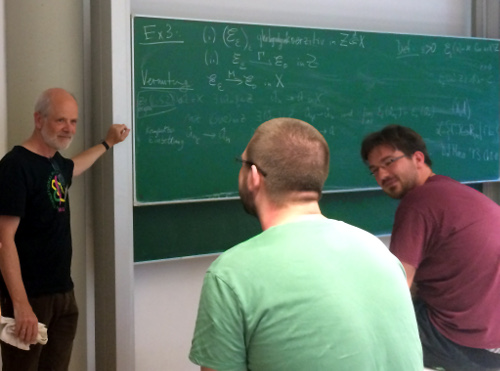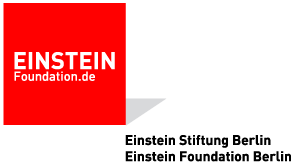Energy-based mathematical methods for reactive multiphase flows
Winter Semester 2020/21
You will be momentarily forwarded to the NEW website of the Thematic Einstein Semester!
Organizers
Volker
Mehrmann (TU Berlin)
Alexander Mielke (HU Berlin / WIAS)
Dirk Peschka (WIAS)
Marita Thomas (WIAS / U. Kassel)
Barbara Wagner (TU Berlin / WIAS)
Next dates
- Oct 12—23, 2020: Student Compact Course
- Oct 26—30, 2020: Kick-off conference
Scope
Since the early works of Lagrange and Hamilton for classical mechanics and Rayleigh and Helmholtz
for
dissipative processes,
energetic variational methods for fluids and solids have been developed extensively.
The relation to underlying microscopic stochastic models was pioneered by Onsager leading to his
celebrated
reciprocal relations.
However, most systematic developments concerned either purely conservative Hamiltonian systems or
purely
dissipative gradient systems.
In the last two decades, a unification of these two extremes was addressed by developing concepts
for
systems
combining both systems.
More recently, these topics evolved into mathematical theories such as GENERIC and port-Hamiltonian
structures.
Corresponding thermodynamical structures are advantageous from the modeling point-of-view and for
the design
of
efficient numerical schemes.
However, different communities have developed own languages and specific mathematical methods that
are not
always accessible for non-experts.
This Thematic Einstein Semester will bring together scientists from different communities to develop synergies between the different approaches. The mathematical community could contribute (to) the structural analysis of flowing systems concerning, for example, the geometry of thermodynamic systems, functional analytical frameworks for partial differential equations, description of bulk-interface coupling, connection to microscopic/stochastic models, construction of structure-preserving numerical schemes, model reduction or modular modeling. Communication with applied material research communities in mathematics, physics and engineering will cover diverse material systems such as, for example, reactive flows, porous medium flow, hydrogels, electrolytes, colloidal and non-colloidal suspensions, nematic materials, and beyond, where thermodynamic descriptions play an important role.
The semester is organized within the framework of the Berlin Mathematics Research Center MATH+ and supported by the Einstein Foundation Berlin.
If you want to advertise this event, then you can use this flyer (pdf).
We are committed to fostering an atmosphere of respect, collegiality, and sensitivity. Please read our MATH+ Collegiality Statement.Activities
3-day Workshops
Date: TBA, Location: Berlin
Info: Jointly organized with SPP 2171, SFB 1114, SPP 1984
Student Compact Course
Participation: We welcome everyone interested in the course to join and participate. Lectures will be given by researchers from Berlin and guests of the Thematic Einstein Semester on topics related to analysis, modeling, numerics, optimization, control, model reduction using energetic variational methods. The lecturers will present problems which are supposed to lead to projects to be solved by small groups of students during the TES BMS semester and presented in the final conference.
Even if you just want to take part in the student compact course, please leave us a short message so we can estimate the number of participants. If you want to take part in one of the projects of the TES BMS Semester, please apply to the TES BMS Semester as described below.
I want to participate

TES BMS Semester
Application: We invite graduate students (working toward a M.Sc. or PhD or equivalent) from all disciplines related to or with an interest in the topics energy-based mathematical modeling/analysis/numerics/applications to apply. We particularly encourage students from Berlin to take part in the Thematic Einstein Semester. Due to the funding by the Einstein Foundation, a limited number of scholarships can be provided to support students from outside Berlin or abroad. We particularly encourage female students and students from under-represented minorities to apply, as well as students from smaller institutions. In order to apply, please send the following documents, all written in English and combined into a single PDF file to tesenergy(at)wias-berlin.de:
- A cover letter describing your experience & motivation to take part in the Thematic Einstein Semester (2 pages max.)
- A short CV (2 pages max.)
- A transcript containing relevant classes you attended (only course titles and grades)
- A letter of recommendation from your advisor
- If required, an application for financial support of travel costs
The deadline for applications is April 15, 2020. Questions concerning the application process, the scholarship, or the Einstein Semester can be addressed to tesenergy(at)wias-berlin.de.

